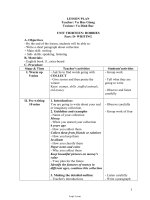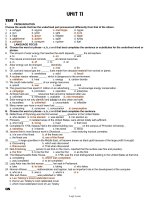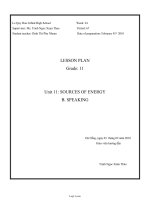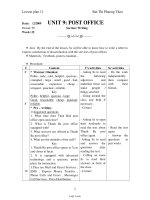Thiết kế bài dạy môn Tiếng Anh 11 - Unit 8: Celebrations - Period: 45 - Lesson 1: Reading
Bạn đang xem bản rút gọn của tài liệu. Xem và tải ngay bản đầy đủ của tài liệu tại đây (135.76 KB, 3 trang )
<span class='text_page_counter'>(1)</span>UNIT 8: CELEBRATIONS Period: 45. Lesson 1: Reading. * The Objectives: By the end of the lesson, students will be able to learn some new words and structures about Tet as well as know more clearly about one of the most popular celebrations in Vietnam - Tet * Teaching Aids: Textbook, colored chalks, posters, realia * Procedure: Time 5’. Content. Teacher’s & Ss’ activities. I-Warmer: NAMING PICTURES 2. 1. SEPTEMBER. MAY. Vietnamese National Day. Labor Day. 20. 8x. NOVEMBER. MARCH. Teacher’s Day II- Pre-Reading 10’ . Women’s Day. Pre-teach vocabulary apricot blossom (n) : hoa mai (situation) peach blossom (n) : hoa đào (situation) kumquat tree (n) : cây quất (translation) sticky rice (n) : nếp (explanation) lucky money (n) : tiền mừng tuổi (visual) Brainstorming Lucky money going to the pagoda. new clothes. 20’. - T. elicits vocabulary from students - S. answer teacher’s questions - T. gives a model - S. repeat chorally and individually - T. checks part of speech, stress and the meaning - T. elicits the words which students think when talking about Tet - S. list the words as many as possible. TET. fruits. - T. gives instruction - T. divides class into 2 groups - S. play the game - T. decides the winner. flowers visiting relatives, friends, teachers. III- While-Reading Task 1: Find what the following words mean in the text (Use a dictionary when necessary) 1. grand: to lớn, hoành tráng 2. agrarian: thuộc về nông nghiệp 3. banner: băng ron, khẩu hiệu 4. pray: cầu nguyện Lop11.com. - T. asks students to work in pairs to find the meaning of these words - S. work in pair to do the task - T. calls on some students to write the answers on the board.
<span class='text_page_counter'>(2)</span> 5. sugared apples: táo dầm, tẩm đường 6. excitement: sự nô nức, nhộn nhịp Task 2: Decide whether the statements are true (T) or false (F). 1. Tet is always on 20th February on the Western calendar. 2. According to the text , for people anywhere in the world the beginning of spring is the start of a new year. 3. Tet used to be longer than it is nowadays. 4. According to the text, “ lucky money” is given to everyone at Tet. 5. Kumquat trees are popular both in the North and in the South of Viet Nam. 6. People try to be nice and polite to each because they want to have good luck on New Year’s Day. KEYS: 1.F 2. F 3. T 4. F 5. T 6. F. 9’. 1’. Task 3: Answer the following questions. 1. When is Tet holiday in Viet Nam? 2. How long did Tet preparations and celebrations last in the past ? 3. What do streets look like before Tet? 4. What do people often do to prepare for Tet? 5. What is banh chung made from? 6. What is mut? 7. What are some popular activities at Tet? Answers: 1. It’s sometime between 19 January and 20 February. 2. For months 3. They are decorated with colored lights and red banners. 4. They buy gifts, clean and decorate their houses and cook traditional foods. 5. It’s made from sticky rice, green beans and fatty pork. 6. It is candied fruit such assuaged apples, plums or tomatoes. Visiting friends and other family members, exchanging wishes, going to the pagoda, playing games, ect IV-Post-Reading: DISCUSSION xTell each other about last Tet holiday, focusing on the following main points • how you prepared for Tet • how you decorate your house • who you visited • what special food you ate • what activities you enjoyed doing most during Tet * Homework Revise the lesson Prepare for the speaking lesson. Lop11.com. - T. asks students to read the passages individually and decide whether the statements are true or false - S. do the task - T. goes around the class, monitors and provides help if necessary - T. calls on some students to give the answers - T. corrects and asks students to copy down the correct answers. - T. asks students to work in pairs to ask and answer the questions - S. work in pairs and do the task - T. calls some pairs: one asks and one answers then write on the board - T. explains and corrects the answers - S. copy the correct ones. - T. asks students to work in group of 4 to discuss - S. get into group and do discussion - T. calls some students for presentation in front of the class.
<span class='text_page_counter'>(3)</span> Lop11.com.
<span class='text_page_counter'>(4)</span>









